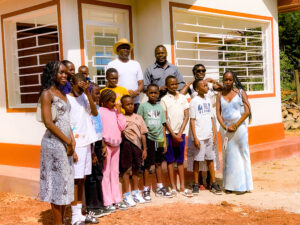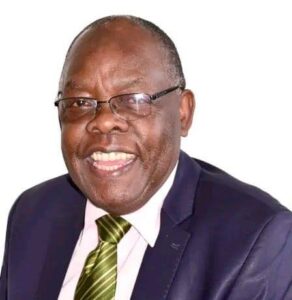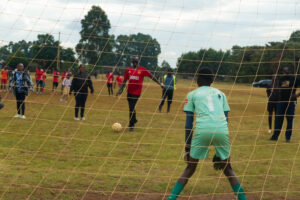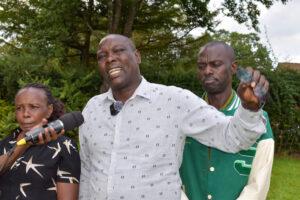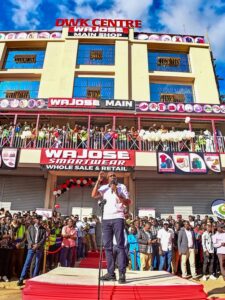Uasin Gishu Journalists Association Reaches Finals of National Policy Hackathon on Digital Democracy
UJA plans to roll out its fact-checking hub and media literacy programs well ahead of the 2027 General Elections, working closely with journalists, citizens, and regulators to reduce misinformation by at least 50% and to strengthen public trust in journalism.

Ibrahim Too and Kemuma Achieng of the Uasin Gishu Journalists Association present their fact-checking and digital safety proposal during the Policy Hackathon at the KenSafeSpace/SM4P Workshop in Mombasa
The Uasin Gishu Journalists Association (UJA) has emerged as one of the finalists in the national Policy Hackathon on Safe and Inclusive Digital Spaces, held in Mombasa during the KenSafeSpace/SM4P (Phase II) Workshop. Although UJA did not secure a top-three finish, the association stood out as the only organization from the North Rift region to reach the finals on its first attempt.
A National Competition for Digital Policy Innovation
The Policy Hackathon, convened by KICTANet and Internews under the KenSafeSpace initiative, brought together grassroots innovators from across Kenya to tackle pressing challenges in the digital space. According to KICTANet, the competition attracted 141 applications from community-based and civil society organisations across Kisumu, Eldoret, Nakuru, and Mombasa. After rigorous review, 17 teams were shortlisted to pitch their ideas, with three ultimately receiving seed funding to scale their solutions.
The winners were:
-
Policy Action Initiative – #NetSafi: Safeguarding Kenya’s Digital Democracy (EUR 4,000): Introducing Youth Digital Watch Cells in coastal counties to monitor misinformation on platforms such as Facebook and WhatsApp and co-create a National Roadmap on Electoral Disinformation with key stakeholders.
-
SEYA Youth Organization – Civic Digital Inclusion Policy Lab (EUR 3,000): Developing an inclusive policy framework to integrate youth with disabilities into Kenya’s digital civic space and amplify marginalized voices.
-
Yplus Kenya – Youth Digital Safety Toolkit (EUR 2,000): Closing the gap between Kenya’s digital protection laws and youth-friendly practice through policy dialogues, training of Youth Digital Safety Champions, and launching a chatbot/USSD platform for safe reporting.

These projects aim to combat misinformation, digital exclusion, online harassment, and other emerging threats to Kenya’s democracy ahead of the 2027 General Elections.
UJA’s Debut and Its Focus on Fact-Checking
Representing UJA at the hackathon were Ibrahim Too and Kemuma Achieng, who presented the association’s proposal: “Strengthening Media Integrity and Countering Political Misinformation Ahead of Kenya’s 2027 General Elections.”
The proposal outlined the establishment of a North Rift Media Integrity and Fact-Checking Centre to curb disinformation, promote gender-sensitive reporting, and build community media literacy. The plan includes a fully equipped verification hub, training for journalists and citizen reporters, outreach to residents, and 24/7 monitoring of political narratives during election periods.
UJA’s Chair, James Gitaka, praised the team’s effort and reaffirmed the association’s commitment to implementing its ideas:
“This was our first attempt at the hackathon. We featured on how to deal with fact-checking to combat mis- and disinformation, information manipulation, and dealing with TFGBV (technology-facilitated gender-based violence), which we will continue to implement before, during, and after the general elections.”
TFGBV—acts of gender-based harm committed, assisted or amplified through digital tools—has become a growing threat to women journalists and candidates in Kenya. Research by civil society groups has found that online harassment and false narratives discourage women and youth from political participation.
Gains Beyond the Prizes
Although UJA did not receive a monetary award, the association gained valuable resources, including access to social media monitoring tools, fact-checking training guidelines, and technical support from leading technology institutions. These resources will strengthen its capacity to monitor misinformation, train journalists, and protect vulnerable groups from online abuse.
UJA also used the platform to build new partnerships with national and regional stakeholders. This engagement is expected to support its long-term goal of establishing a sustainable Media Integrity Centre in the North Rift—an area historically exposed to election-related misinformation and hate speech.
Why It Matters
Kenya’s digital information ecosystem is evolving rapidly, with new platforms, AI-driven disinformation, and technology-facilitated harassment posing fresh challenges to democracy and civic participation. Community-based organisations like UJA are essential in filling the gaps between policy and practice, bringing a regional and grassroots perspective to national efforts.
By reaching the finals of the Policy Hackathon, UJA has demonstrated that even first-time participants can influence Kenya’s digital policy agenda and contribute to building safer, more inclusive online spaces.
UJA plans to roll out its fact-checking hub and media literacy programs well ahead of the 2027 General Elections, working closely with journalists, citizens, and regulators to reduce misinformation by at least 50% and to strengthen public trust in journalism.
As James Gitaka summed up: “Our journey at the hackathon was only the beginning. We will continue to push for truth over propaganda and empower journalists to report ethically, inclusively, and fearlessly.”
With this commitment, the Uasin Gishu Journalists Association signals a new chapter for media integrity and digital democracy in Kenya’s North Rift region.

